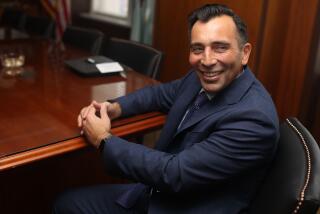Judicial Corruption Trial Begins
- Share via
SAN DIEGO — The corruption case against two former Superior Court judges and a high-profile civil attorney went to trial Thursday amid complaints from defense attorneys that a judge from Los Angeles has ignored their pleas for adequate time to prepare.
Defense attorneys for ex-judges James Malkus and G. Dennis Adams and attorney Patrick Frega argued bitterly that U.S. District Judge Edward Rafeedie rushed the case to trial before the defense had time to evaluate a mountain of evidence amassed by federal prosecutors during a two-year investigation.
“I am deeply scared that my incompetence is going to endanger my client,” said attorney Jerry Coughlan, who represents Malkus.
Coughlan said he has not had time to listen to tape recordings from the state Commission on Judicial Performance hearings into the allegations that served as the basis for the criminal indictment in April: that Malkus and Adams improperly received gifts and favors from Frega while handling matters involving his cases.
Rafeedie, known as an exceptionally strong-willed jurist, said Coughlan could listen to the tapes while driving his car or lying in bed at night.
“The court does not believe any defendant is suffering any prejudice because the trial cannot be delayed a month or two,” Rafeedie said.
When Mario Conte, a public defender representing Adams, rose to join Coughlan’s objection to starting the trial, Rafeedie indicated that he had heard enough. “I don’t want to hear any more from you either, Mr. Conte,” the judge said.
Rafeedie ordered the attorneys to stop complaining to reporters that he has not allowed them sufficient time to get ready. He said such statements seem aimed at influencing the jury and are “a mark of professional immaturity.”
The defense attorneys all enjoy sizable reputations, and the looming courtroom battle between them and a team of federal prosecutors is the talk of San Diego’s tightknit legal community.
“Every lawyer in town wants to watch these guys go at each other,” said one San Diego attorney.
Representing Frega are San Francisco lawyers Dennis P. Riordan and Harold Rosenthal. Riordan is best known for his work on behalf of Black Panther Johnny Spain and “Onion Field killer” Gregory Powell.
Riordan clashed with Assistant U.S. Atty. Phillip Halpern when he continued to argue in favor of a pretrial motion that Rafeedie had rejected. “With all due respect to Mr. Riordan,” Halpern told Rafeedie, “it’s like confronting the Energizer Bunny: He just keeps going and going.”
Rafeedie is hearing the case because all 11 federal judges in San Diego know the defendants and therefore recused themselves. On Wednesday, Rafeedie rejected a raft of defense motions and quickly selected a jury so that Thursday could be devoted to opening statements.
The defendants are charged with racketeering and mail fraud. The racketeering statute is used in cases in which the government alleges that defendants conducted their business--in this case, the court system--with criminal intent.
The mail fraud charge alleges that the three passed notes and letters about the gifts and Frega’s court cases. To obtain a conviction, prosecutors need not prove that Frega received specific favorable treatment for a specific gift.
Prosecutors will argue that Frega, soon after arriving in San Diego in the late 1970s, began lavishing gifts and favors on local judges and that he finally settled on Malkus, Adams and Michael Greer for his largess. Among the gifts were automobiles, automobile repairs, dinners, clothing and jobs for relatives.
Greer, suffering depression and a severe heart condition, pleaded guilty to bribery for taking gifts valued at $75,000 from Frega. In exchange for avoiding a prison sentence, Greer has agreed to testify for the government.
Greer and Malkus resigned in 1993 in the middle of a Commission on Judicial Performance investigation into the alleged unreported gifts. The California Supreme Court, acting on the commission’s recommendation, removed Adams from the bench in 1995.
Rosenthal told the jury in his opening statement that the government had taken an unduly sinister view of the relationship between Frega and the judges.
In what may be a common defense explanation, Conte said Adams, in accepting gifts and favors from Frega, “made mistakes that he deeply regrets. His conduct was foolish and careless but not criminal.”
Assistant U.S. Atty. Steve Clark had a different interpretation of the relationship between the judges and Frega: “This is a simple case of a violation of the public trust.”
More to Read
Sign up for Essential California
The most important California stories and recommendations in your inbox every morning.
You may occasionally receive promotional content from the Los Angeles Times.










